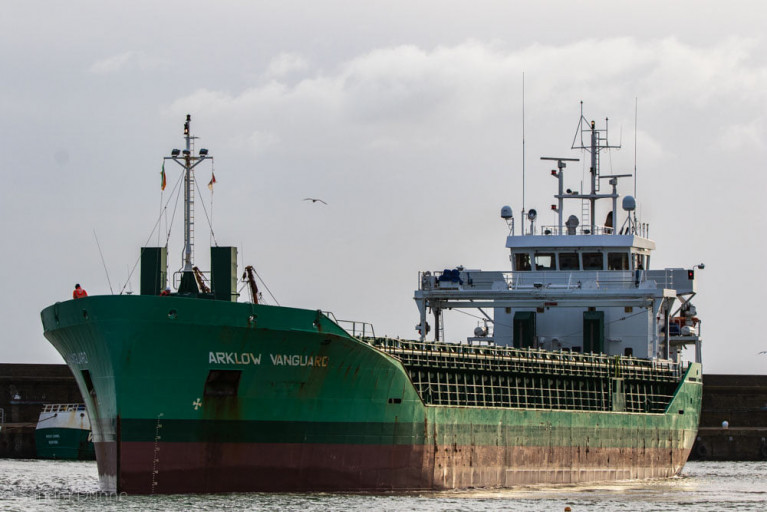Displaying items by tag: Rare call
Before signing off for Afloat's report on RV Celtic Voyager's Dun Laoghaire call and bad weather forecast for Wicklow Head, this led to tracking an Arklow Shipping cargoship on a rare call bound to the nearby port, writes Jehan Ashmore.
The Arklow Vanguard had anchored overnight off Wicklow Head having sailed across the Celtic Sea from Avonmouth Docks (see: story), one of the two Bristol Port Co. ports. The other is Royal Portbury Docks on the opposite bank of the River Avon.
This morning the Royal Bodewes built Arklow Vanguard (2017/2,999grt) berthed alongside the Packet Quay, where the berth is the most used by commercial shipping in Wicklow Port. The cargoship was in ballast to load recyclable metals.
Arklow Vanguard's 'maiden' call to the east coast Irish Port is the first Arklow Shipping cargoship in almost a decade to Wicklow when Afloat reported on previous coaster's call to load scrap metal.
On that occasion in June, 2011, the Irish flagged Arklow Rebel (exactly same tonnage) of today's 'V' class though at 86.93m long is slightly shorter compared to the 'R' class (89.99m) dating to 2005.
Arklow Vanguard is the first to carry this name for ASL, albeit this particular cargoship is managed by their Dutch arm, Arklow Shipping Nederland B.V.
Among other vessels in port are AMS Retreiver and Husky, both belonging to Wicklow based Alphamarine and otherwise previously known as Island Shipping.
#irishports - A most unusual caller to Dun Laoghaire Harbour took place recently with the arrival of a tanker marking a rare event that has not occurred in three decades, writes Jehan Ashmore.
Early on Sunday afternoon the 4,107 gross tonnage tanker Thun Gemini had arrived into the south Dublin Bay harbour.
According to Afloat sources the 2003 built ship is in port for maintenance reasons. Otherwise the 114m Dutch flagged tanker is a regular on the short sea route between Milford Haven, south Wales and the Irish capital.
It was soon after the arrival of Afloat to the port yesterday that came an unexpected surprise as the ship's stern free-fall lifeboat was launched. This led to the splash generated as the lifeboat made contact with the water close to the Carlisle Pier head.
The exersise to launch the enclosed orange lifeboat rekindled personal memories on the occasion of the previous tanker that visited the harbour. This took place in April 1989. More shall be revealed on Afloat next week on the 30th anniverary of that unique event which is among numerous chapter's that have enriched the harbour's maritime heritage.
Thun Gemini today remains berthed in port having sailed at the weekend the short distance from one of the four berths at the oil jetty terminal in neighbouring Dublin Port. The terminal has a 330,000 tonne facility handling oil products, bitumen, chemicals and liqued petroleum gases that are linked to a common user pipe line system.
The tanker is operated by Thun Tankers, part of Erik Thun AB as previously reported on Afloat.ie. The family owned shipping business is located in Lidköping on the southern shores of Lake Vänern, the third largest lake in Europe, which is connected to the sea by a shipping canal.





























































